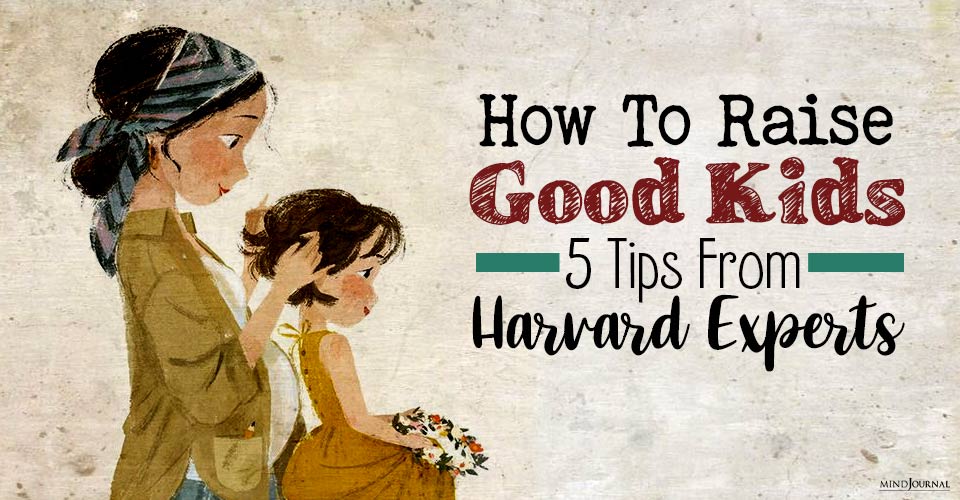How to raise good kids? Parents who raise good kids always focus on the things that actually matter in life, rather than the things that we are made to believe matter. The values, morals, and principles that make us good are what they choose to ingrain in their children.
Technology has taken over the world and raising children now is very different from before smartphones, computers, the internet, tablets, and other gadgets came into being. There used to be parks filled with children, and kids running across the streets trying to catch butterflies.
They played football but not on their Xbox consoles. They tried to find out their hiding friend rather than a Pokémon on screen. They would play until the sun went down and then come indoors.
Raising children now is way more different than it used to be a few decades ago but it’s time we got back to basics.
In this new era, children are given new gadgets automatically to entertain them. There are loopholes in this new trend. What are they? Psychologists at Harvard University conducted a study on what makes a well-adjusted child in this ever-changing time. They concluded that there are several aspects that are still very basic.
Below are some secrets about parents raising good kids, according to Harvard psychologists. Ready to find out how to raise good kids?
Related: 10 Habits To Strengthen Your Relationship With Your Child
How To Raise Good Kids: 5 Tips From Harvard Experts
1. Give Them Your Time
No gift or gadget can equal the time you spend with them. Giving them your time is like giving them a part of your life and that is exactly what they deserve and what they need.
It is a simple suggestion but we are bombarded 24/7 with work and have busy lives just to stay in the race. It’s easier to give a child a toy or an Xbox console to keep them busy and, of course, get away from our responsibilities towards them. So, if you’re wondering how to raise good kids, always make sure that they spend a lot of quality time with them.
When you give time to your kids, be with them in person, interact or play with them, go on a trip with them, or simply read a book, because these become the gifts they will cherish forever. They won’t remember what you bought for them but the time you spent with them will always live in their hearts.
2. Speak Out Loud To Your Children
It is linked to spending time with your child. Find out what’s going on in your child’s life. Check with teachers, coaches, trainers, and other caretakers. Find out if there has been any unusual behavior lately. Make room for your child, and make sure they are comfortable coming and speaking to you.
Your child needs to feel they are loved and they are important to you and simply giving them things they desire is not enough. Acknowledge it through words. Let them hear they are loved and appreciated. Invite them to sit with you and share their stories about school, friends, etc. This is one of the best things you can do if your aim is raising good kids.
Related: Raising Resilient Children: 5 Parenting Strategies To Know
3. Teach Them Problem-Solving Skills
One of the greatest gifts you can give your child is the ability to analyze and solve problems.
Let your child make his own decisions. You cannot solve their issues all the time. It’s healthy to let them have first-hand experience in dealing with the ups and downs of life. When we allow them to determine what they want we are raising their awareness at the same time while gifting them leadership qualities.
Let them come to you with their problems and then only guide them. It is hard as parents to sit back and watch their child make mistakes but that’s ok. That is how they will learn and that is how self-sufficient adults are made.
We need to make sure happiness comes before achievement. We need to teach our children to be happy first. Success is not the ultimate goal. Success will not bring fulfillment. Let happiness come first.
4. Show Them Gratitude
When you think about how to raise good kids, always teach them the importance of being grateful. Children need to learn that gratitude is a remarkable gift. Parents should give their children chores and then express how grateful they are for the accomplishment.
Honor and acknowledge them for their performance in whatever they do. We shouldn’t praise only the uncommon acts of kindness and achievements. Raising kids can be a beautiful and profound experience for both kids and their parents.
The world needs more empathetic people and it’s our duty to make more of them. Children learn by example and we are responsible for setting these examples. Be grateful for the small acts they perform that have nothing to do with their academic performance. Show them the pleasure that lies in compassion. Teach them the art of giving.
Related: 9 Guiding Principles For More Positive Parenting
5. Broaden Their View
What this means is to teach your child to see the larger picture. This is linked to showing them gratitude. Let them experience the world through your compassion. Teach your child to interact well and interact without technology.
Teach them to listen. This sounds absurd but not everyone can listen these days. Teach them to be empathetic. Teach them to not judge not only within the family circle but outside of it too. Teach them to not judge anyone based on their religion, color, caste, nationality, or gender.
Exposing your children to cultural diversity will help you develop a loving, kind, compassionate, and happy person.
A child’s mind is like a blank paper that gets filled with examples from our actions. Let us do it responsibly. They are the future of not only a nation but of the entire planet. Help them navigate this world through compassion, kindness, and love. You are raising a soul and you are solely responsible for bringing in love or hate. So, the next time you think about how to raise good kids, always focus more on empathy and goodness.
Source: Making Caring Common Project – Harvard University
https://mcc.gse.harvard.edu/resources-for-families/7-tips-raising-caring-kids











Leave a Reply